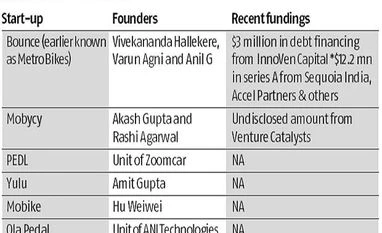When Pravin Kumar came to New Delhi a year ago to fulfil his dream of becoming an IES (Indian Engineering Services) officer, he had a difficult choice to make — rent an affordable accommodation far from the coaching centre or hire the pricier ones close to the institute.
“It was a difficult situation to be in. Rooms close to the coaching were way too expensive and staying too far meant wasting a lot of time on public transport,” says Kumar.
But he soon found the solution to his problem, when he discovered a dock of cycles parked close to his institute. The cycles, which are now seen in several cities in the country, are part of a revolution that is taking place in urban mobility — dockless cycle-sharing. As the name suggests, these cycles can be hired, used and left at the user’s destination at a price which can be as less as Rs 1 per hour.
The sector recently saw huge funds flowing in. Metro Bikes, a rental start-up for motocycles and bicycles that recently rebranded itself as Bounce, raised $3 million in debt financing from InnoVen Capital. The funding came a few moths after Sequoia India, Accel and others infused $12.2 million into the start-up. Gurugram-based Mobycy also raised an undisclosed amount from Venture Catalysts this month.
Akash Gupta, co-founder of Mobycy, says the funding will be utilised for the company’s diversification into electric bikes. While Mobycy claims to be clocking over 100,000 rides every month across three cities, Bounce’s co-founder and CEO Vivekananda Hallekere says the firm is managing over 10,000 rides every day, including those on electric bikes and scooters.
Apart from Bounce and Mobycy, Zoomcar’s PEDL, Yulu, China’s Mobike and Ola Pedal are other major players.
China’s Ofo, the world’s largest bike-sharing app, had also entered the Indian market in January 2018, but it soon pulled out of the country following a cash crunch.
Opportunity
Bounce co-founder and CEO Vivekananda Hallekere says the firm is managing over 10,000 rides every day, including on electric bikes and scooters
The sector has seen immense growth over the years in China, the US and several European markets. Globally, China leads the bike-sharing market with a reported valuation of around $1.62 billion. Two of the biggest companies in the sector — Ofo and Mobike — are also based in China.
India, for the last few years, is being seen as the next big market for the industry. The biggest reason being the announcement of Smart Cities Mission, which entrepreneurs and investors believe will boost the business.
As part of the mission, many Indian cities are in the process of setting up a public bike-sharing system through a public-private partnership model. Bhopal, Pune and Coimbatore are among the cities where the system is already functional.
Hallekere believes cycle and bike-sharing start-ups have a huge potential in India as only about 18 per cent of its population has access to personal mobility.
“Keeping congestion in mind and also the real estate required for two-wheelers, we see that two-wheelers are the natural and most preferred mode of commute in India,” says Hallekere.
Challenges
Given India’s poor (non-existent in many cities) cycling infrastructure, emulating a Chinese or a European business model is not expected be a smooth ride for these start-ups. “The first challenge is to bring a change in the mindset of people and the government towards bicycle,” says Gupta.
Even if the infrastructure issue is resolved, the extreme weather conditions might deter prospective users.
Then the dockless bike-sharing model has a problem of its own. As users are allowed to leave cycles wherever they want, theft and vandalism have become major issues for many such start-ups in China, Europe, and also in India.
The problem of theft had once become so big for Mobike in Manchester, the UK, that the firm even threatened to pull out.
Gupta agrees that theft is an issue but says the company is working on a two-front model to solve it. “While we have the technology in place to keep a check on any such incidents, the company has also initiated a loyalty programme wherein users get points for reporting any such event,” he says.
Unlock 30+ premium stories daily hand-picked by our editors, across devices on browser and app.
Pick your 5 favourite companies, get a daily email with all news updates on them.
Full access to our intuitive epaper - clip, save, share articles from any device; newspaper archives from 2006.
Preferential invites to Business Standard events.
Curated newsletters on markets, personal finance, policy & politics, start-ups, technology, and more.
)